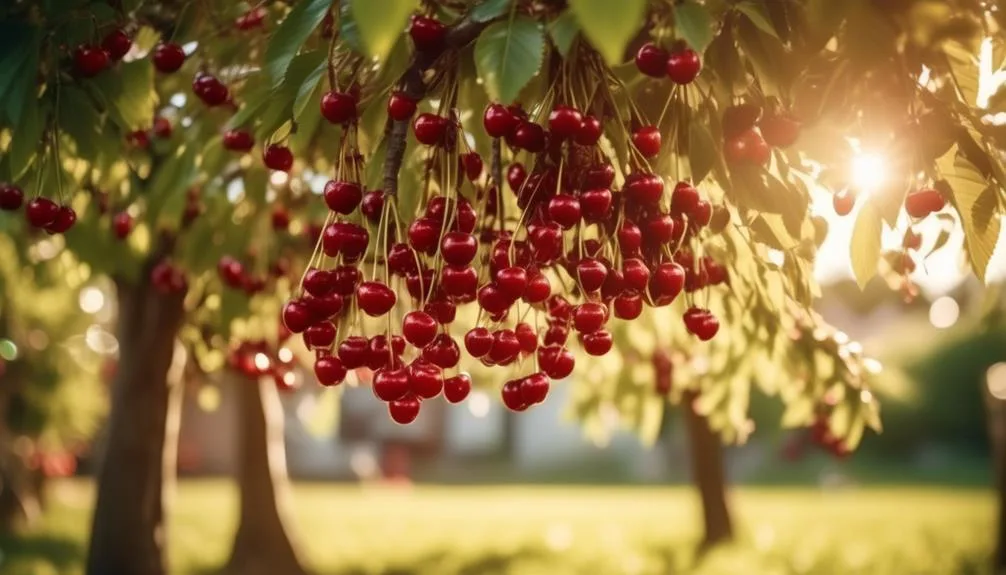Cherry trees need specific fertilizers to stay healthy and produce fruit. Choosing the right fertilizer can be tricky, but we've got you covered.
Whether you're new to gardening or have experience, understanding the types of fertilizers for cherry trees is essential for their well-being.
Let's explore the world of cherry tree fertilizers together and make sure your trees get the nourishment they need to thrive.
Nitrogen-based Fertilizers
To promote healthy growth and vibrant foliage, consider using nitrogen-based fertilizers for your cherry trees. Cherry trees thrive in slightly acidic soil with a pH range of 6.0 to 6.8. Before applying any fertilizer, it's crucial to conduct a soil test to determine the pH levels and nutrient deficiencies. Once you have the soil test results, you can choose a nitrogen-rich fertilizer that suits your tree's specific needs.
When applying the fertilizer, ensure even distribution around the tree's drip line to reach the feeder roots effectively. Nitrogen promotes leafy growth and overall tree vigor, making it essential for the development of your cherry trees.
Phosphorus-rich Fertilizers
Consider the vital role of phosphorus in enhancing the root development and fruit production of your cherry trees, building on the foundation of nitrogen-based fertilizers for their overall health and vigor. Phosphorus absorption is crucial for energy transfer, root growth, and blooming.
When selecting phosphorus-rich fertilizers, it's important to consider the soil pH levels, as phosphorus availability is greatly affected by pH. Cherry trees thrive in slightly acidic soil with a pH ranging from 6.0 to 6.8.
Look for fertilizers with a high middle number in the N-P-K ratio, indicating a significant phosphorus content. Superphosphate and bone meal are excellent choices as they release phosphorus steadily, promoting sustained growth.
Potassium-enhanced Fertilizers
Enhance the vitality of your cherry trees by incorporating potassium-enhanced fertilizers. These fertilizers play a crucial role in promoting disease resistance, regulating water uptake, and improving overall fruit quality.
Before applying any fertilizers, it's essential to conduct soil testing to determine the specific nutrient needs of your cherry trees. Soil testing methods help in identifying if there's a deficiency in potassium, allowing for targeted and effective fertilization.
Potassium is vital during various cherry tree growth stages, such as bud development, fruit setting, and overall tree vigor. It also aids in strengthening cell walls, making cherry trees more resilient to diseases and environmental stress.
Organic Fertilizers for Cherry Trees
When nourishing your cherry trees, choosing organic fertilizers can significantly benefit their growth and overall health.
Organic fertilizers, such as compost, offer numerous benefits for cherry trees. Composting benefits the soil by improving its structure, drainage, and ability to retain moisture, which is vital for cherry tree health. Organic fertilizers also contribute to the overall health of the soil by promoting beneficial microbial activity and enhancing soil nutrient levels.
By using organic fertilizers, you can improve soil health and fertility, providing a more sustainable and natural environment for your cherry trees to thrive. This approach not only benefits the cherry trees directly but also has positive implications for the surrounding ecosystem.
Making the switch to organic fertilizers can lead to healthier, more vibrant cherry trees while supporting the long-term health of the soil.
Slow-release Fertilizers
As you nourish your cherry trees with organic fertilizers, you can further optimize their growth and health by considering the benefits of slow-release fertilizers.
Slow-release fertilizers offer a sustained nutrient supply to cherry trees, promoting steady growth and minimizing the risk of over-fertilization.
When applying slow-release fertilizers, consider the seasonal timing to ensure that nutrients are available when the trees need them most. These fertilizers can be applied in early spring to support vigorous growth during the growing season.
Additionally, their environmental impact and sustainability concerns are lower compared to some fast-acting synthetic fertilizers, as they release nutrients gradually, reducing the risk of nutrient runoff.
Embracing slow-release fertilizers aligns with environmentally conscious practices and contributes to the long-term health and vitality of your cherry trees.
Conclusion
Incorporating the right fertilizers is key to nurturing healthy and fruitful cherry trees. Whether it's nitrogen-based, phosphorus-rich, or potassium-enhanced options, or organic and slow-release choices, the proper nourishment will foster robust growth and an abundance of delicious cherries.
Follow specific directions for each fertilizer type and witness your cherry trees flourish with strength and vitality.
Happy gardening!

My interest in trees started when I first saw the giant sequoias in Yosemite.
I was a teenager then, and I remember thinking, “I need to learn more about this.”
That moment stuck with me.
A few years later, I went on to study forestry at Michigan Tech.
Since graduating, I’ve worked in a mix of hands-on tree care and community education.
I’ve spent over ten years helping people understand how to plant, maintain, and protect the trees in their neighborhoods.
I don’t see trees as just part of the landscape.
They are living things that make a real difference in our daily lives.
